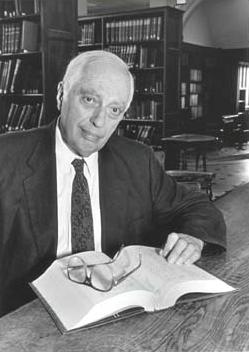Bernard Lewis

(1916-)
Bernard Lewis is a renowned British-American Jewish
historian of Orientalism, Islam, and the Middle East.
Lewis (born May 31, 1916) was born to middle-class Jewish parents in the British captial, of London. Already by his bar mitzvah, Lewis had become interested in languages and history
and he later graduated from the
School of Oriental and African Studies (SOAS) at the University of London
with a B.A. in history with a concentration in Near and Middle East
studies. Three years later, Lewis earned his Ph.D, also from SOAS, in Islamic
history. He studied under the tutelage of Louis Massignon, a French
scholar of Islam, as a postdoc at the University of Paris, and earned
the “Diplome des Etudes Semitiques” in 1937. Lewis subsequently
returned to SOAS to become an assistant lecturer in Islamic history.
During World War II, from 1940-1941, Lewis served in
the British Army in the Royal Armored Corps and Intelligence Corps.
After the war, he returned to SOAS and in 1949, when he was 33 years-old,
the school appointed him to chair the Near and Middle Eastern History
department. In 1974, Lewis accepted a joint position at Princeton
University and the affiliated Institute for Advanced Study.
In 1947, he married Ruth Helene Oppenhejm, with whom
he had a daughter and a son before their separation in 1974.
In 1966, Lewis was a founding member of the Middle
East Studies Association of North America (MESA), and in 2007 –
because MESA was dominated by anti-Israel academics and those critical
to Israel’s and America’s role in the Middle East –
he broke away from the group and founded the Association for the Study
of the Middle East and Africa or ASMEA. Lewis chaired ASMEA, which is
an academic society aiming to promote the highest scholarly standards
of research and teaching in Middle Eastern and African studies and related
fields.
After his retirement from Princeton in 1986, Lewis served
at Cornell University until 1990. In 1990, the National Endowment for
the Humanities selected Lewis for the Jefferson Lecture, the U.S. government’s
highest honor for achievement in the humanities. His lecture, “Western
Civilization: A View from the East,” was printed in The Atlantic
Monthly under the title “The Roots of Muslim Rage;” and
his 2007 Irving Kristol lecture at the American Enterprise Institute
was published in The Atlantic as “Europe and Islam.”
Middle East policy analyst Martin Kramer characterized Lewis as the most influential postwar historian of Islam and the Middle East for his ability to make these subjects accessible to a broad public in Europe and North America.
Lewis is the author of forty-six books on Islam and
the Middle East, including his most recent publications, Notes on
a Century: Reflections of a Middle East Historian; The End
of Modern History in the Middle East; and The Crisis of Islam:
Holy War and Unholy Terror. He also wrote three major syntheses for general audiences: The Arabs in History (1950); The Middle East and the West (1964); and The Middle East (1995). These books have been translated into more than twenty languages and have made Lewis' name synonymous with Islamic history for educational publics in the West.
Lewis is the Cleveland E. Dodge Professor Emeritus
at Princeton University.
Sources: Wikipedia; Martin Kramer; The Atlantic; NPR |